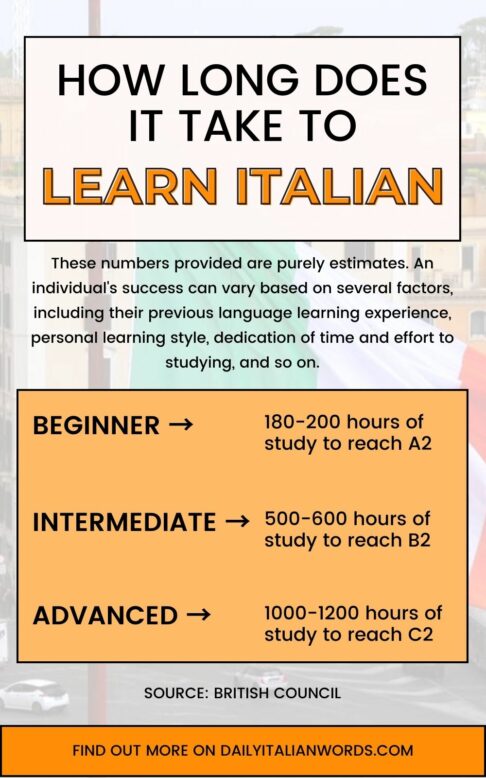Are you ready to start learning Italian? You’re in good company! Embarking on the journey of learning a new language, be it Italian or any other of the world’s 6000+ tongues, can be both exhilarating and challenging at the same time.
Italian is currently one of the most popular choices for language enthusiasts, and for good reason. For some, the pleasure of studying the language lies in its musicality and expressive nature. Others feel a profound connection to Italian due to their heritage or ancestral ties. Learning Italian allows them to explore their roots, connect with family members who still live in Italy, and forge a deeper understanding of their cultural background.
If you’re curious about the time it takes to become proficient in Italian, this blog post will provide insights into the learning process, from acquiring the basics to achieving fluency. Let’s begin!

Ethics statement: Within the article, there are affiliate links. If you buy something after clicking the link, we will receive a small commission. To know more about our ethics, you can visit our full disclosure page. Thank you!
How Many Hours Does It Take to Learn Italian?
According to the US Department of State’s Foreign Service Institute, it can take a dedicated student anywhere between 600 and 2200 class hours of study to achieve general professional fluency in a foreign language. That’s a pretty wide range!
Those languages that require less time for English speakers to master fall into Category I, which encompasses all the Romance languages, including Italian. In other words, a student should ideally be able to attain general proficiency in Italian after 24 weeks of intense study.
Of course, this is just an estimate. The truth is that it is impossible to determine precisely how long it will take you, with your unique set of strengths and weaknesses, to learn Italian. The duration varies depending on a wide range of factors, including:
- your previous language learning experience
- whether you already speak another Romance language (French, Spanish, etc.)
- how often you set aside time to practise
- the effectiveness of your learning methods
- whether you have the chance to immerse yourself in the language
- your personal study habits
- how much you enjoy talking to people
- and so on…
To put this into perspective, let’s consider the fictitious example of Maria, an English-Spanish-speaking bilingual who studied French and German at university. She has a passion for meeting new people and exploring the world through travel. Due to her linguistic background and extroverted personality, Maria statistically stands a significantly higher chance of rapidly achieving a high level of proficiency in Italian compared to someone who is more introverted or lacks prior experience in learning a second language.

How Long Does It Take to Learn Basic Italian? (Level A1-A2)
Now that we’ve highlighted some of the caveats, let’s take a look at how long it takes on average to learn basic, intermediate and advanced Italian, using the CEFR global sale as our guideline.
If your aim is to grasp the basics of Italian, including essential vocabulary, basic grammar, and simple conversations, you should expect to invest around 180-200 hours of dedicated study to reach level A2. This will enable you to handle everyday situations, introduce yourself, ask for directions, and engage in basic social interactions.
How Long Does It Take to Learn Intermediate Italian? (Level B1-B2)
In general, reaching a B2 level in Italian – which is the level that allows you to hold more complex conversations without breaking into too much of a sweat – can take around 500-600 hours of study and practice. Level B2 is more or less equivalent to the US Department of State’s Foreign Service Institute’s definition of general professional proficiency.
If you are at an A2-B1 level, we highly recommend checking out Serena Capilli’s short stories in Italian for beginners. Read our review here!
How Long Does It Take to Learn Italian Fluently?
You’ve aced levels A and B; now you’re on the cusp of conquering level C! On average, a serious student who commits themselves to the mastery of Italian can reach the C1 level after 700-800 hours of study or the C2 level after 1000-1200 hours of study. Once you reach this level of fluency, you’ll be able to engage in complex conversations, understand Italian media including the radio, TV and films, and express yourself comfortably in various contexts.
Source for estimated hours of study: British Council (note that the hours listed are for English proficiency but they apply to English speakers learning other European languages as well)

How Long Does It Take to Learn Italian as an English Speaker?
As an English speaker, you already have a substantial advantage over many of the world’s populations. That’s because English and Italian share much of the same lexicon due to their shared Latin roots. While I couldn’t find an exact figure, it is known that English and French have a lexical similarity of 27%. Considering that French and Italian share a lexical similarity of 89%, it’s reasonable to assume that English and Italian also have a substantial lexical foundation in common.
What does this mean for you, as an English-speaking learner of Italian? Well, it implies that you have fewer new words to learn since many of these words already exist in your own language, albeit with slightly different pronunciation! Just take into consideration the following examples:
- interesting → interessante
- price → prezzo
- rice → riso
- telephone → telefono
- special → speciale
It goes without saying that English speakers generally find Italian easier to learn compared to languages with vastly different structures like Chinese, Japanese or Arabic.

How Long Does It Take to Learn Italian After Spanish?
If an English speaker has a head start in learning Italian, then a Spanish speaker is already halfway to the finish line! Many of my Spanish-speaking acquaintences have told me that, even without any knowledge of Italian, they can pick up the basic meaning of simple conversations in Italian. Likewise, my Italian friend became far more fluent in Spanish after spending just two weeks in Barcelona than he did in his two years of German lessons.
Does this mean Spanish speakers don’t make mistakes in Italian? Quite the contrary! In fact, it is very common for Spanish speakers to assume that certain words or phrases exist in Italian simply because they exist in Spanish, which can result in some embarrassing mistakes. Some classic false friends include burro (donkey in Spanish, butter in Italian) and pronto (soon in Spanish, ready in Italian).
Can I Learn Italian in 2 Weeks? 3 Months? 6 Months?
As we’ve reiterated throughout this article, learning a language like Italian requires time and consistent effort. Any course that claims to teach you to speak Italian fluently in as little as a week or two is most certainly oversimplifying the language learning process and setting unrealistic expectations. Don’t let yourself be fooled by false promises!
That being said, in two weeks, you can certainly make lots of progress. We advise creating flashcards to pick up some basic phrases and vocabulary, following a course, starting to read in Italian with an app like LingQ that allows you to look up and save new vocabulary, and taking private lessons on a platform such as italki if you don’t have access to native speakers.
And if you continue to study with the same amount of dedication, there is no reason why you shouldn’t make significant progress in three to six months. Remember, the key is consistency – 5-10 minutes of study every day is far better than an hour once a week.

How long did it take me to learn Italian?
You may be curious about the length of time it took me to reach a C2 level in Italian. Before delving into that, let me begin by providing some insights into my background, personality, and personal journey.
Although I grew up as an English monolingual in Canada, I had prior experience with language learning when I embarked on studying Italian. I had achieved a decent level of fluency in Japanese after spending two years as an exchange student there, and I also had a rudimentary grasp of French thanks to nine years of elementary school classes.

I would consider myself a studious individual who enjoys dissecting grammar and unraveling the structure of a new language. However, my shyness and self-consciousness tend to hold me back. I find it difficult to let go and make mistakes, unless I’ve had a drink or two to loosen up!
When I moved to Italy as an au pair, I had very limited Italian proficiency, aside from a few phrases I had picked up from the Michel Thomas audio course (affiliate link). It took me approximately three months to reach a point where I could comprehend simple conversations and communicate at a basic level. Although I used English throughout the day for my job, I was exposed to the children speaking Italian and had opportunities to practice with my host parents and new Italian friends. I also attended a weekly Italian language school for a year.

Within a couple of years, I felt comfortable using Italian in most situations, and for many subsequent years, I maintained a level between B1 and B2. Perhaps it was complacency, but I simply didn’t have the time or energy to take my Italian skills to new heights.
However, when my son was born and I made the decision to exclusively speak Italian to him, I refined my study techniques. I started reading complex novels and news articles in Italian and made it a habit to note down and study unfamiliar words on a daily basis. By consistently following this approach, I managed to reach a C2 level within a year.
Of course, now that I no longer live in Italy, the real challenge is maintaining my C2 level. The struggle is real, my friends! 😃
Conclusion
If you’re ready to embark on the path to proficiency in Italian, this blog post has (hopefully) provided you with valuable insights into the learning process, covering everything from the time it takes to acquire the fundamentals to attaining fluency. With this newfound knowledge, you’re well-equipped to embark on your Italian language journey. So, what are you waiting for? Pull out those Italian textbooks and let the adventure begin!


Heather Broster is a graduate with honours in linguistics from the University of Western Ontario. She is an aspiring polyglot, proficient in English and Italian, as well as Japanese, Welsh, and French to varying degrees of fluency. Originally from Toronto, Heather has resided in various countries, notably Italy for a period of six years. Her primary focus lies in the fields of language acquisition, education, and bilingual instruction.


